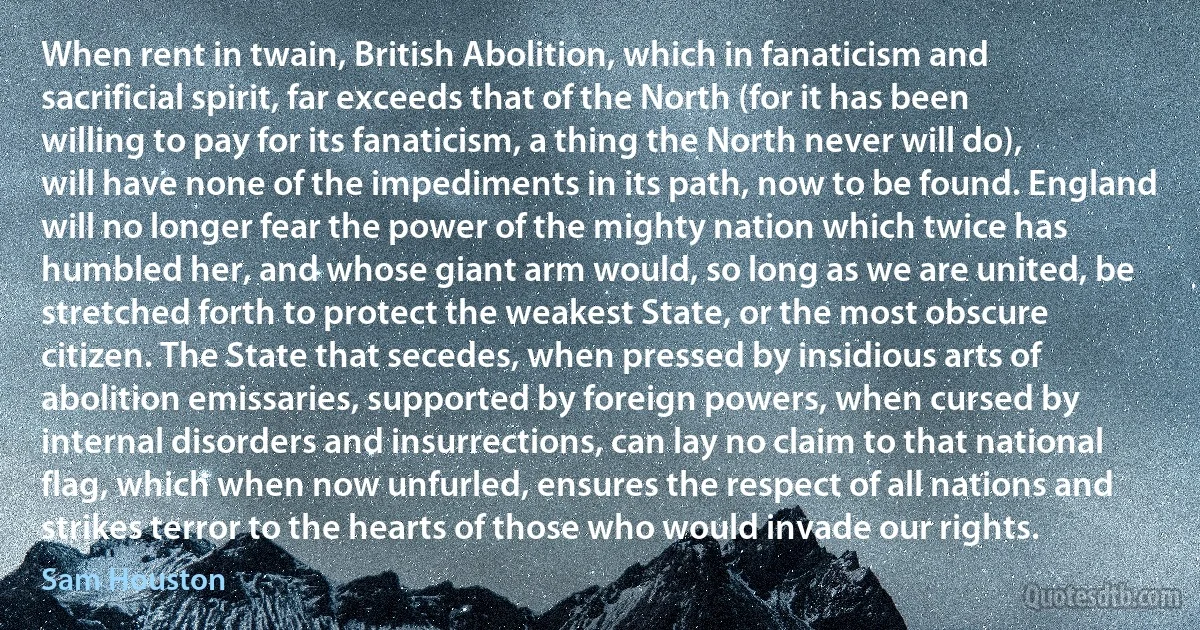
When rent in twain, British Abolition, which in fanaticism and sacrificial spirit, far exceeds that of the North (for it has been willing to pay for its fanaticism, a thing the North never will do), will have none of the impediments in its path, now to be found. England will no longer fear the power of the mighty nation which twice has humbled her, and whose giant arm would, so long as we are united, be stretched forth to protect the weakest State, or the most obscure citizen. The State that secedes, when pressed by insidious arts of abolition emissaries, supported by foreign powers, when cursed by internal disorders and insurrections, can lay no claim to that national flag, which when now unfurled, ensures the respect of all nations and strikes terror to the hearts of those who would invade our rights.
Sam HoustonRelated topics
abolition arm claim fanaticism far fear found foreign forth giant lay longer mighty nation national none north now path pay power rent respect spirit state thing willing heartsRelated quotes
I am presently at work on a dissertation dealing with the theory of international trade and foreign exchange rates. In dealing with this, studies of the intervention of recent years in the area of trade and exchange rates of different countries is of the greatest importance. I therefore hope to be able to begin a six month study tour to Switzerland, France and England at the end of May this year. After having collected the necessary material I intend - if the economic side can be arranged - during a stay of 6–12 months in England (probably Cambridge) or possibly the United States (in that case probably Harvard University) - to work out the above mentioned dissertation as a specimen for the doctoral degree in philosophy and pursue studies in general. I have not yet any detailed study plan. That should appropriately be set up after the arrival.

Bertil Ohlin
If Christ were to walk in this world today, do you know what would happen to Him? He would be placed in a mental institution and given psycho-therapy, just as would His Saints. The world would crucify Him today just as it did 2000 years ago, for the world has not learned a thing, except more devious forms of hypocrisy. And what would happen if, in one of my classes at the university, I would one day tell my students that all the learning of this world is of no importance beside the duty of worshipping God, accepting the God-man who died for our sins, and preparing for the life of the world to come? They would probably laugh at me, and the university officials, if they found out, would fire me-for it is against the law to preach the Truth in our universities. We say that we live in a Christian society, but we do not: we live in a society.

Seraphim Rose
We are socialists because we see the social question as a matter of necessity and justice for the very existence of a state for our people, not a question of cheap pity or insulting sentimentality. The worker has a claim to a living standard that corresponds to what he produces. We have no intention of begging for that right... Since the political powers of the day are neither willing nor able to create such a situation, socialism must be fought for. It is a fighting slogan both inwardly and outwardly. It is aimed domestically at the bourgeois parties and Marxism at the same time, because both are sworn enemies of the coming workers' state. It is directed abroad at all powers that threaten our national existence and thereby the possibility of the coming socialist national state.

Joseph Goebbels
June 7, 1776, Richard Henry Lee, on behalf of the Virginia delegation, submitted to the Continental Congress three resolutions, of which the first declared that "these United Colonies are, and of right ought to be, free and independent States, that they are absolved from all allegiance to the British Crown, and that all political connection between them and the State of Great Britain is, and ought to be, totally dissolved. This resolution, which may conveniently be called the Resolution of Independence, was finally voted by the Continental Congress on the 2 of July, 1776. Strictly speaking, this was the official declaration of independence; and if we were a nation of antiquaries we should no doubt find an incongruity in celebrating the anniversary of our independence on the 4 of July.

Carl L. Becker
I now make it my earnest prayer, that God would have you, and the State over which you preside, in his holy protection; that he would incline the hearts of the citizens to cultivate a spirit of subordination and obedience to Government; to entertain a brotherly affection and love for one another, for their fellow citizens of the United States at large; and, particularly, for their brethren who have served in the Geld; and finally, that he would most graciously be pleased to dispose us all to do justice, to love mercy, and to demean ourselves with that charity, humility, and pacifick temper of the mind, which were the characteristicks of the divine Author of our blessed religion ; without an humble imitation of whose example, in these things, we can never hope to be a happy Nation.

George Washington
